Reclaimed wood was a design choice for many of the exhibitors this year at the International Contemporary Furniture Fair in New York City at the Jacob Javits Convention Center May 19-21. The event hosted more than 400 exhibitors and 12,000 attendees from 88 countries, featuring curated collections tailored for residential, contract, and hospitality environments.
From LED lighting to kitchen tables, this year’s exhibitors brought life into discarded wood, chose eco-friendly options, and above all, sustainability was key.
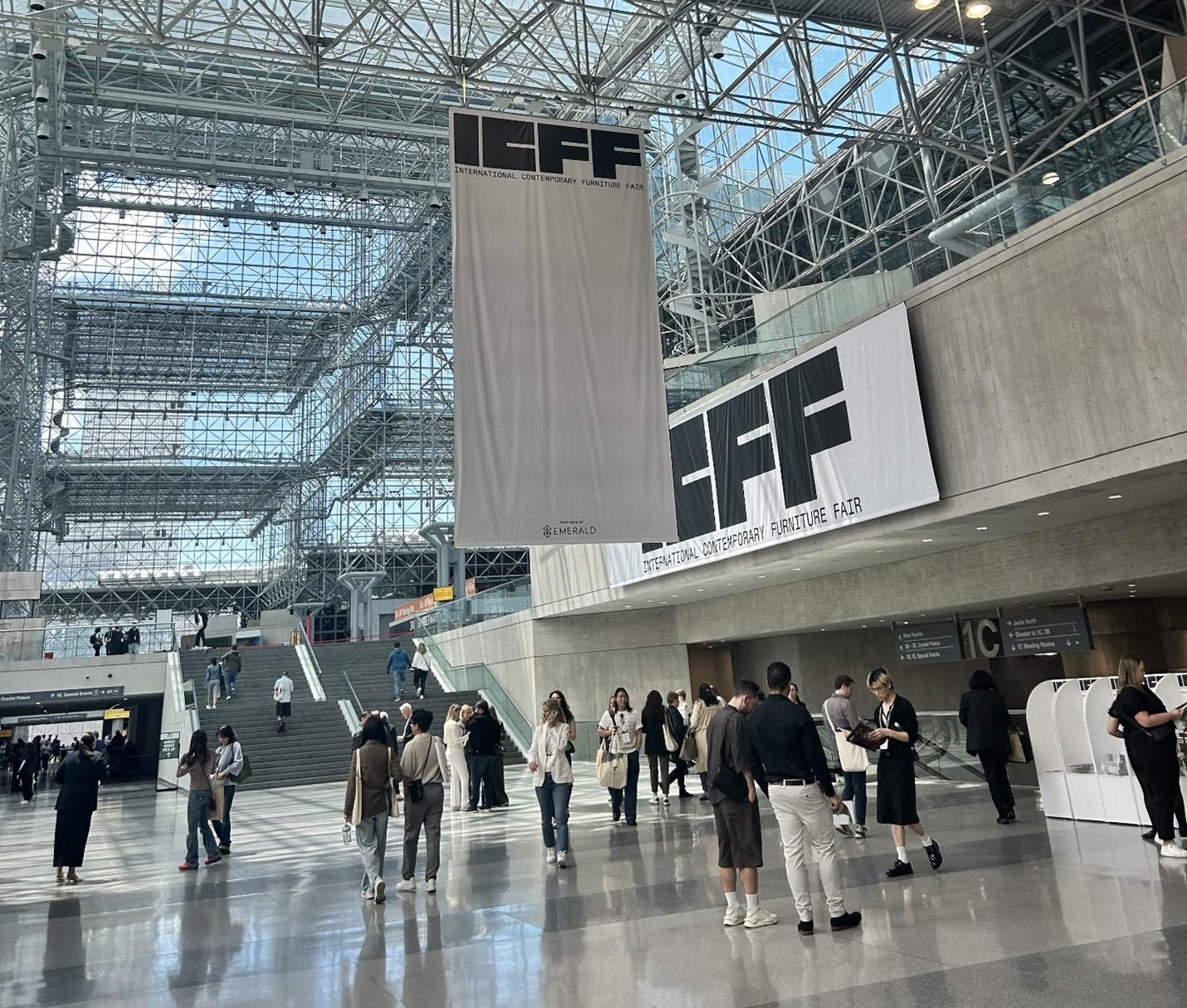
The International Contemporary Furniture Fair hosted more than 400 exhibitors and 12,000 attendees from 88 countries at the Jacob Javits Convention Center in New York City May 19-21.
Reclaimed wood was a design choice for many of the exhibitors this year at the International Contemporary Furniture Fair in New York City at the Jacob Javits Convention Center May 19-21. The event hosted more than 400 exhibitors and 12,000 attendees from 88 countries, featuring curated collections tailored for residential, contract, and hospitality environments.
From LED lighting to kitchen tables, this year’s exhibitors brought life into discarded wood, chose eco-friendly options, and above all, sustainability was key.
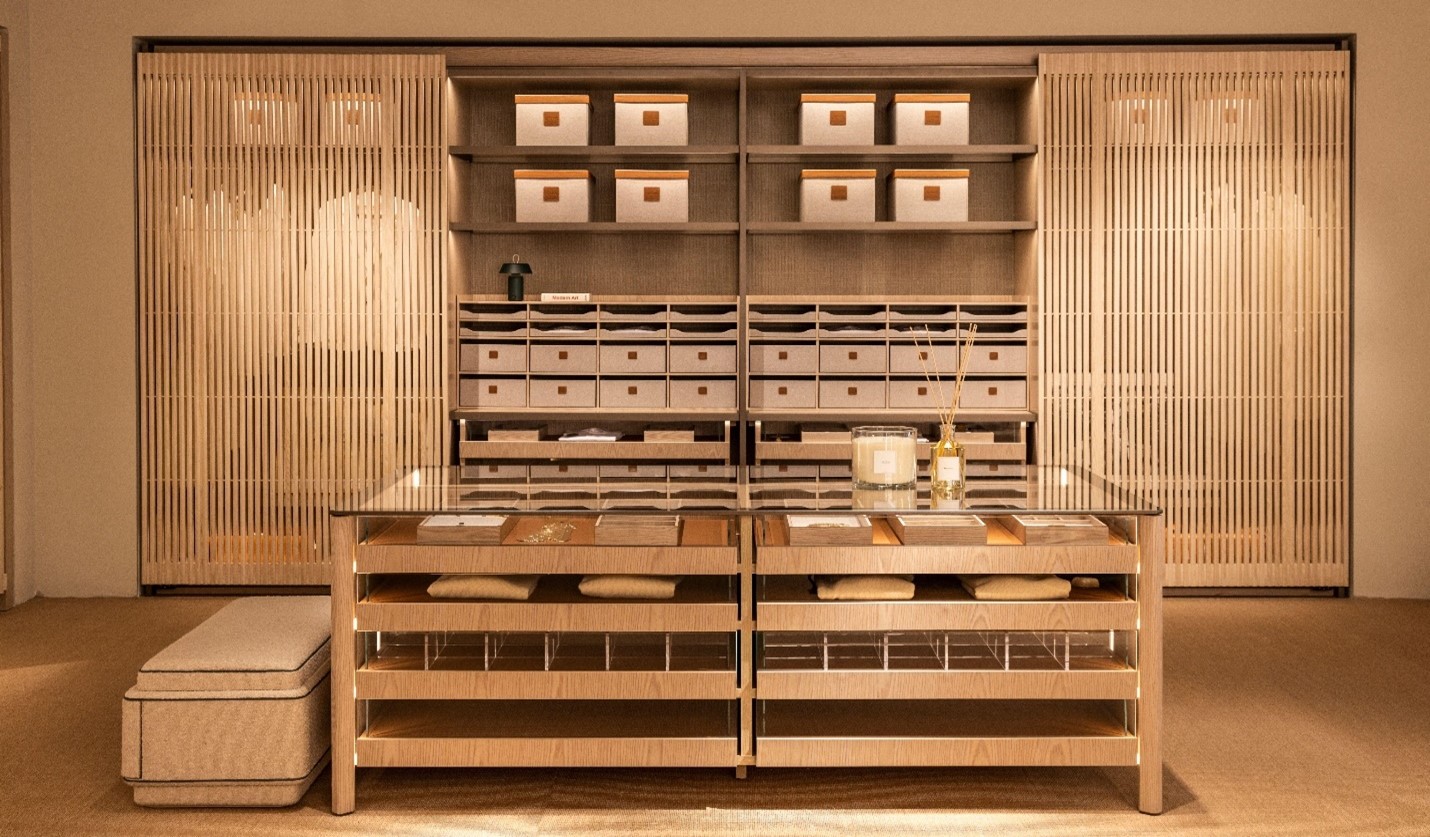
“Timeless Closet” from Ornare’s Timeless collection, which features pieces crafted with environmentally friendly practices and materials.
Exhibitors, Designers
Ornare, a luxury furniture brand, unveiled its latest series, “Timeless.” This new collection includes a range of furniture and cabinetry that aligns with modern trends and functionality.
One of the highlights of Ornare’s participation in the show was its emphasis on sustainability. Each piece in their collection was crafted with environmentally friendly practices and materials. From sourcing renewable woods to using non-toxic finishes, Ornare is committed to reducing its ecological footprint without compromise.
Visitors at the fair were treated to live demonstrations by Ornare’s master craftsmen, showcasing the meticulous process involved in creating each piece. The demonstrations not only highlighted the brand during the show but also provided a deeper appreciation for the artistry involved in high-end furniture making for visitors to the booth.
Another design company, Fallen Industry, a reclaimed wood design shop based in Brooklyn, also exhibited at the show. Their specialty is live-edge tables, desks, and specific furniture pieces for clients. The use of traditional methods and eco-friendly practices make Fallen Industry a favorite among corporate offices like Netflix, Amazon, and Apple in New York.
Fallen Industry was started by Paul Kruger in 2011. After seeing a piece of driftwood in the Hudson River, his creativity sparked. That became an outlet and a profitable business. Kruger and his team specialize in live edge tables, shelves, and other furniture.
The reclaimed wood comes from all over the country. “We work with 300 mills and arborists across the country,” Kruger states. “So, if a tree is going to fall into someone’s house, or is knocked down for construction, for example, the material gets salvaged. That’s where our material comes from most of the time.”
Chair designer Jomo Tariku debuted fresh iterations of his classic chair designs and stools from the Fair showroom. Fabricated by Justin Nelson of Fernweh Woodworking, the hand-made designs are crafted from American walnut and ash wood with turned silhouettes and holly inlays meant to mimic antelope horns. The Ethiopian-American furniture maker is recognized as one of the most outspoken and passionate figures advocating for more diversity and inclusion in the industry.
“We are all about eco-friendly and healthy practices in everything we do,” says table and educational furniture designer James Burleigh.
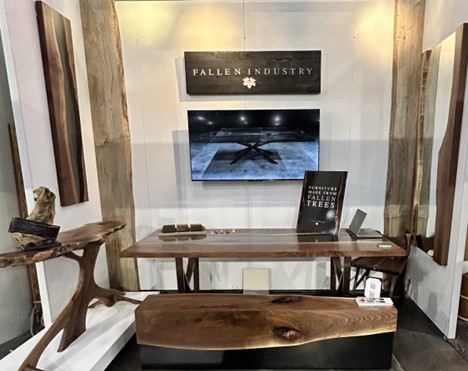
Fallen Industry, a reclaimed wood design shop based in Brooklyn, exhibited live-edge tables, desks, and specific furniture pieces using traditional methods and eco-friendly practices.
Wide ranging programs
Programs at the fair covered a broad spectrum of audiences and interests.
Schools Showcase, which featured 20 international schools and their students, presenting upcoming designs for classrooms across the globe. This segment highlighted the future of design education, offering a glimpse into the creative processes and innovative solutions being developed in academic settings.
Design Schools Workshop provided a platform for both American and international schools to present their projects to a broad audience. This workshop enabled students to receive valuable feedback from industry professionals and facilitated connections that could influence their future careers. The event emphasized the importance of fostering young talent and integrating academic projects with real-world industry insights.
At the heart of the fair, The Crossroads exhibition focused on sustainability. In a collaboration between ICFF, David Rockwell, Rockwell Group, and co-curator and editor Pei-Ru Keh, this edition brought to light the way American designers seek to preserve long-honored craft traditions. Designers, exhibitors, and industry leaders held forums about how they could push the boundaries of consciously re-think the legitimacy of material use, and what American designs can mean for the future of the industry. The events were curated by Tiffany Jow, editor-in-chief of the design journal Untapped.
Wanted, an integral part of ICFF, quickly became the destination for discovering new talent from around the world. It provided a unique platform for engaging with a diverse professional network and initiating new collaborations between designers, manufacturers, and the trades.
This year, Wanted continued its tradition of supporting the next generation of design professionals through multiple opportunities and its own programs, such as Launch Pad and other design centers that focused on specific industries, such as lighting, kitchen design, furniture, and education.
Launch Pad, a key feature of Wanted, included 69 emerging designers who introduced innovative concepts, giving national and international designers a chance to discover fresh ideas. This initiative showcased cutting-edge designs and provided a crucial platform for new voices in the industry, such as Ornare and Fallen Industry.
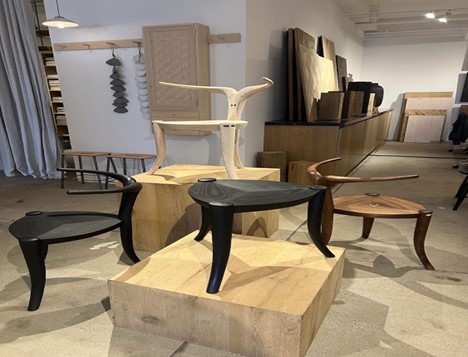
Chair designer Jomo Tariku debuted fresh iterations of his classic chair designs and fabricated by Justin Nelson of Fernweh Woodworking, The hand-made designs are crafted from American walnut and ash wood.
Trends and insights
Taking in the multiple designers and exhibitors from across the country, it was hard to pin down one trend for the furniture fair. One thing all exhibitors agreed on was the use of eco-friendly practices. Reclaimed wood was a design choice for many of the exhibitors. From LED lighting to kitchen tables, this year’s designers brought life into discarded wood, chose eco-friendly options, and above all, sustainability was key.
The emphasis on the environment resonated throughout the fair, highlighting a significant shift in the industry toward more environmentally conscious design. Exhibitors demonstrated how beautiful and functional products could be created from materials that might otherwise have gone to waste.
Exhibitors demonstrated a keen awareness of where their materials came from, how they were processed, and what would happen to them at the end of their useful life. This holistic approach to sustainability was evident in various projects, from small-scale furniture pieces to large installations. The narrative around material sourcing and usage was not just about aesthetics but also about accountability and responsibility.
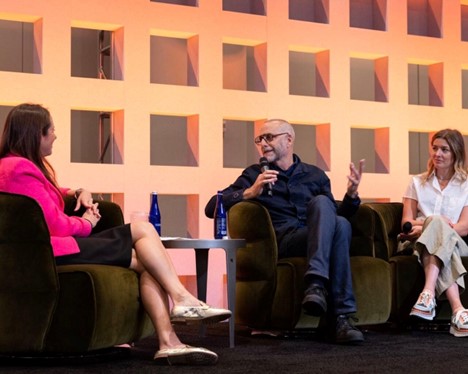
More than 75 design changemakers and emerging talents took center stage as they participated in the ICFF Talks on The Main Stage and The Oasis with a lineup of panel sessions, keynote presentations, and intimate talks to examine the future of residential and commercial design.
ICFF Talks
Over the three days of the fair, designers, architects, interior designers, curators, buyers, and developers gathered and explored the latest products from more than 450 exhibitors, representing 35 countries worldwide. More than 75 design changemakers and emerging talents took center stage as they participated in the ICFF Talks on The Main Stage and The Oasis with a lineup of panel sessions, keynote presentations, and intimate talks to examine the future of residential and commercial design.
The Main Stage and The Oasis stages hosted talks about where the design industry is heading. On the first day, designers Luca Nichetto and Daniel Germani engaged in a talk about ‘The Art of Designing and Creating Meaningful Products,’ moderated by Odile Hainaut and Claire Pijoulat, brand directors of ICFF.
“Our main focus for ICFF and beyond was to foster stronger connections and commerce within the global design community,” Hainaut and Claire said. “We presented content that is evenly split between U.S. and international exhibitors and provided a fresh and innovative perspective that appealed to a younger audience.”
Opening day also saw designers Lindsey Adleman, Hlynur Atlason, Anand Sheth, and other renowned names from the industry. Their talks brought to light an important discussion on the right practice of design and the designer’s responsibilities. Some of these talks included The Art of Designing and Creating Meaningful Products, Sourcing and Reusing Local Wood, How Different Countries Design Sustainably, and The Role of Education in the Future of Design.
Another topic that sparked interest was the integration of technology with traditional craftsmanship. Many designers highlighted how advanced technologies, such as CNC machining and 3D printing, could be harmoniously combined with age-old woodworking techniques. This fusion allowed for greater precision, reduced waste, and the creation of complex designs that would be challenging to achieve manually. The use of technology also enabled designers to experiment with new forms and structures, pushing the boundaries of what is possible with reclaimed wood and other resourceful materials.
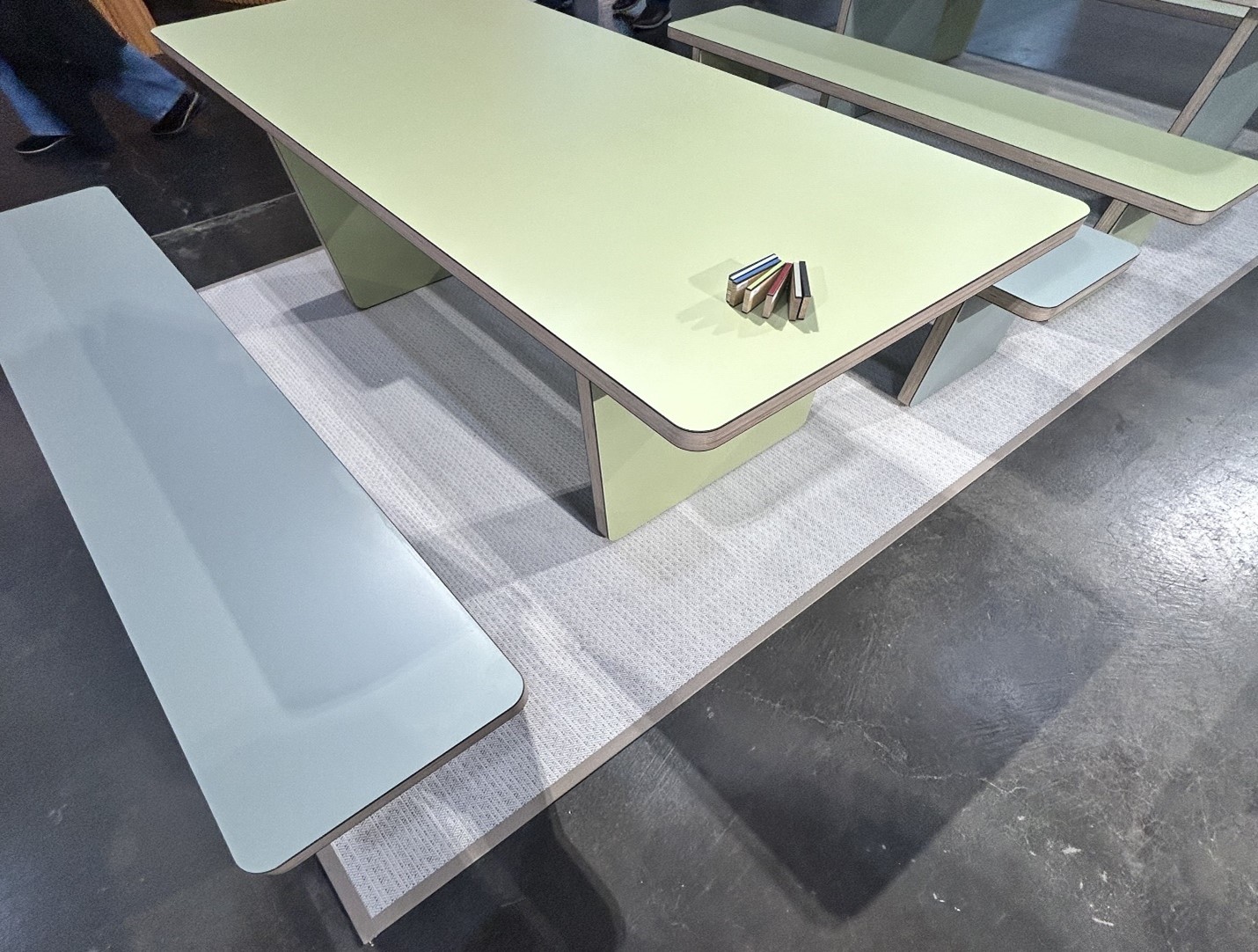
“We are all about eco-friendly and healthy practices in everything we do,” says table and educational furniture designer James Burleigh of the pieces he displayed at ICFF.
Impact, future directions
The success of ICFF and Wanted underscored the importance of such events in promoting innovation, trends, and collaboration within the design community. As the furniture industry continues to evolve, the emphasis on eco-friendly practices is likely to grow, driven by the creativity and commitment of designers showcased at events like ICFF.
The educational components of ICFF, the Design Schools Workshop, and the Schools Showcase, played a crucial role in the sustainability narrative. By involving international and American students, emerging designers, and fair enthusiasts, the programs ensured that the next generation of design professionals are well-versed in trends and various practices. These platforms provided invaluable exposure to real-world industry challenges and the opportunity to receive information from woodworking professionals. These types of interactions are vital in shaping the future of the design industry.
The fair and its exhibitors, through designer practices and keynote speakers, highlighted a fundamental shift that is reshaping the industry. The commitment to eco-friendly practices, the use of reclaimed materials, and the seamless integration of technology and craftsmanship set a new standard for what the contemporary furniture industry can achieve. The success of this year’s ICFF serves as a beacon for future events, encouraging continued innovation, collaboration, and dedication to a cleaner future.

